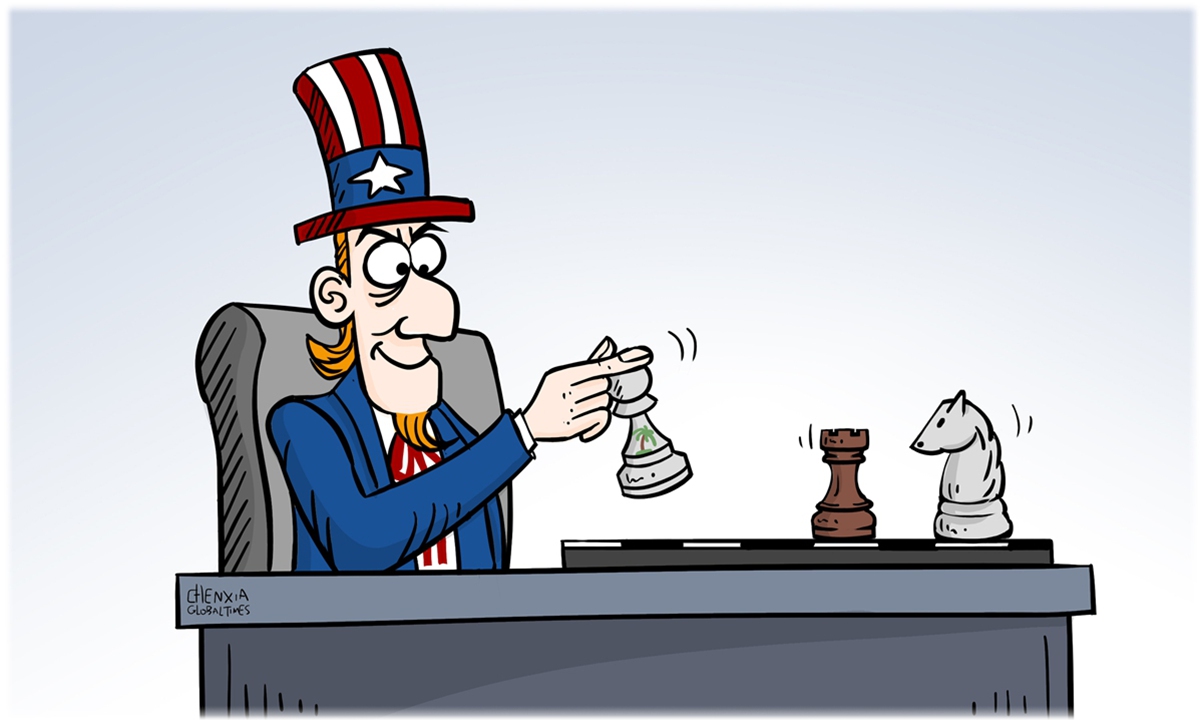
Illustration: Chen Xia/GT
Asked if the US had drifted away from the Pacific in recent decades, US Ambassador to Australia Caroline Kennedy said last month, "We're coming back." But for what? Developing Pacific Island countries such as Solomon Islands or only for US strategic interests?
It's interesting to learn that the US is again sending a high-profile diplomatic delegation to visit the Solomon Islands on August 6-8, led by Deputy Secretary of State Wendy Sherman and Ambassador Kennedy. The visit holds particular personal interest for Sherman and Kennedy, whose fathers both fought here during World War II.
The composition of the delegation is quite obvious and significant for many reasons. As it was expressed over and over again by Washington, the trip will also highlight the reopening of the US embassy here in the capital, Honiara, which is part of the US strategy to counter China's growing influence. But, tackling the so-called rising challenges posed by China and navigating the competition in the South Pacific region is only a matter that the US cares in the view of advancing US interests. It's not about the concerns of the Solomon Islands, whose immediate interests concern climate change and development.
The US closed its embassy in the Solomon Islands in 1993 — one example of its neglect of the region in recent decades — whereas China has increased its influence and footstep in the areas of development, especially in the field of infrastructure, which island countries need the most. Plans to reopen an embassy in the Solomon Islands and invite Pacific leaders to Washington may be a good start, but are not enough.
Leaders of South Pacific Island countries have said at regional and international forums and dialogues that geopolitical point-scoring means less than little to anyone whose community and country is slipping beneath the rising sea, whose job has been lost to a pandemic, or whose family is impacted by the rapid rise in the price of commodities. The people of the Solomon Islands have also expressed opposition to the intentions of major powers to drag the region into a battlefield of strategic competition on social media and other platforms. Can the US heed such voices and listen to the calls?
The US should use the event of 80th anniversary of the battle of Guadalcanal to clean up the mess laying around the islands in Solomon Islands. The battle of Guadalcanal only lasted little more than six months, while the battle against unexploded ordnance in Solomon Islands and elsewhere in the Pacific is taking years and years to win.
Millions of dollars have been spent, yet clearance is sporadic. How many more innocent lives will be lost before decisive action is taken by the US government? The US may want to use the event to advance their broken promises over the years, something that the people of Solomon Islands are tired of hearing during anniversary after anniversary for the past eight decades. For dwellers of the islands, the clearance work is expensive and beyond the means of many Solomon Islanders. Nor should it be their burden. Despite international support to rid the country of World War II explosive remnants, it has obviously not been enough.
The US said it would continue to provide support to remove bombs from Solomon Islands. The Battle of Guadalcanal was codenamed Operation Watchtower and brought together the US and the allied forces under a common strategy. Why not put together a similar level of cooperation needed in the campaign to remove unexploded ordnance, and to respond to demands from Solomon Islanders to clean up a mess not of their making?
Today, US influence should be designed to tackle not just the so-called China challenge but an array of "forces that threaten to destabilize the region" including climate change, COVID-19, natural disasters, internal conflict, poor governance and resource scarcity. The US should also coordinate with its regional allies, partners, and the private sector to reestablish a credible presence in the region. It would be a mistake to reduce the region to an arena of geopolitical competition. It's probable that the US will use the event of the 80th anniversary of the battle of Guadalcanal to advance its strategic intentions not only in the Solomon Islands, but the Pacific region as a whole, but that's not what we want.
The author is the Foreign Policy Consultant at the Foreign Policy Advisory Secretariat (FPAS), Office of the Prime Minister & Cabinet, Solomon Islands Government. opinion@globaltimes.com.cn




